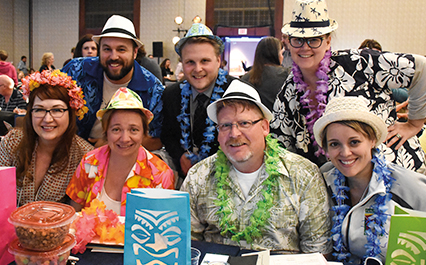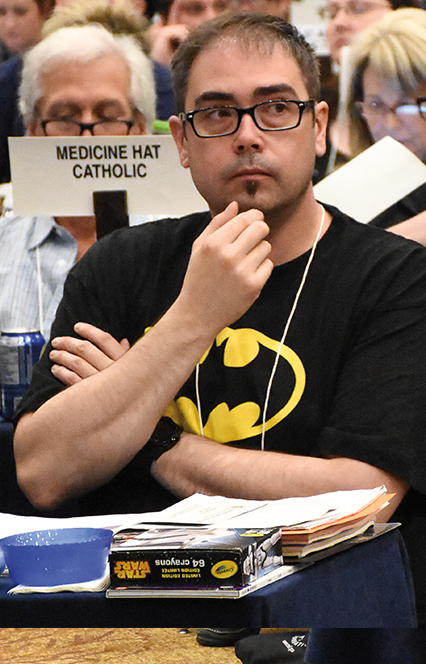Page Content
Nancy Ball speaks at ARA 2016 on Saturday, May 21.
When the 2016 version of the Annual Representative Assembly officially convened, it didn’t take long for the subject to turn to the wildfire disaster that forced the evacuation of Fort McMurray on May 3.
Nancy Ball, president of Fort McMurray Local No. 48, was one of the very first people to speak. Backed up by a seven-person contingent of local members, all wearing T-shirts stating “Fort Mac will fight back,” she thanked teachers from Alberta and across the country for their support.
“As our days have turned to weeks, our thoughts have been with our colleagues, students and their families now relocated from one end of our country to the other,” Ball said. “The outpouring of support is humbling and at times overwhelming.”
Later, when it was time for his annual address, president Mark Ramsankar reminded attendees that Alberta teachers are citizens first.
“They are Albertans who are members of families, communities and this province. One only has to look at the tragic events of Fort McMurray to realize the impact such a catastrophic event can have on a community, a community our colleagues play such an integral part in shaping.
“I heard and read the stories of heroism — teachers and principals staying with students during the evacuation, keeping them calm and reassured until they could be reunited with their families, in many instances not knowing the fate of their own homes. I have a special call out for each of you and continue to pray for you as you face challenges so many of us will never know.”
Helping out
Helping those who’ve experienced traumatic events remained top of mind once the session turned to debating and voting on resolutions.
Motion 3-70 called on the province to provide immediate funding for school-based mental health programs related to trauma resulting from a natural disaster.
While endorsing the motion, a number of teachers who experienced the southern Alberta floods of 2013 said there was funding in place after that catastrophe, but that the funding died out after two years even though it was still needed.
South East district representative Jason Schilling told of a traumatic incident that would have ended his career were it not for supportive colleagues and an employee assistance program that enabled him to get the help he needed.
He said his experience followed a typical pattern, that there was plenty of support immediately after the traumatic event but that, over time, people moved on and put up walls of silence, making it difficult for those who still needed help.
“We need to pass this unanimously because it sends the message to communities, it sends the message to school authorities and to government that we as a profession find walls of silence around mental health issues to be completely unacceptable,” he said.
Delegates also passed two motions aimed at helping refugees. Motion 3-68 called for enhanced funding for refugee students and motion 3-69 called for co-operation between Alberta Education, education faculties, school boards and the Association to reduce obstacles faced by teachers who arrive as refugees.
Child poverty was the target of motion 4-1, which resolved that the Association will fund one teacher per local to attend the annual Well-Being of Children and Youth Conference, an attempt to develop a grassroots understanding of the issues children face.
“Until you see it, you have no idea what poverty is — until you’re in the homes,” said Mark Burke, president of Northland Local No. 69.
Another motion aimed at helping at-risk children was 1-89, which urged the government, the Alberta School Boards Association and school boards to continue to implement strategies that address the needs of children at risk, including those at risk of developing violent behaviour. ❚
In her words
Here is the address delivered by Fort McMurray Local No. 48 president Nancy Ball on the opening day of ARA, Saturday, May 21.
There are over 700 stories of teachers and administrators calming students’ worries and fears on the afternoon of May 3. Seven hundred stories of our members evacuating our community — some meeting up with their own families, others split going north to camps or south on Highway 63.
As our days have turned to weeks, our thoughts have been with our colleagues, students and their families now relocated from one end of our country to the other.
The outpouring of support is humbling and at times overwhelming. Tears flow over acts of kindness and gestures of love and comfort. We are so grateful to our front-line responders.
To the many locals who have reached out to us or have donated to the Red Cross: thank you. To the provincial Association that has been beside us from day one: thank you. To teachers across our country: thank you for your support.
To the countless teachers who now have Fort McMurray and Anzac students in their classes: thank you for showing compassion and kindness.
We may not know what tomorrow may bring, but I am confident that our beloved home, Fort McMurray, will rebuild and be stronger.Many of our teachers come from the east coast — my roots are in Nova Scotia. When I woke up on Wednesday, the day after our evacuation, I found myself humming a song that rings true.
“We rise again in the faces of our children
We rise again in the voices of our song.”
Fort McMurray and Anzac will rise again. ❚
 The contingent from Parkland Teachers’ Local No. 10 show off their colourful garb, an annual ARA tradition. Back row, L-R: Scott Onuczko, Rick Kremp, Sarah Cresswell. Front Row, L-R: Myra Rybotycki, Linda Lageveen-Harrison, Gary Hanna, Jenny Calado.
The contingent from Parkland Teachers’ Local No. 10 show off their colourful garb, an annual ARA tradition. Back row, L-R: Scott Onuczko, Rick Kremp, Sarah Cresswell. Front Row, L-R: Myra Rybotycki, Linda Lageveen-Harrison, Gary Hanna, Jenny Calado.
 Brett Watt from Evergreen Local No. 11 listens intently to a presentation.
Brett Watt from Evergreen Local No. 11 listens intently to a presentation.
